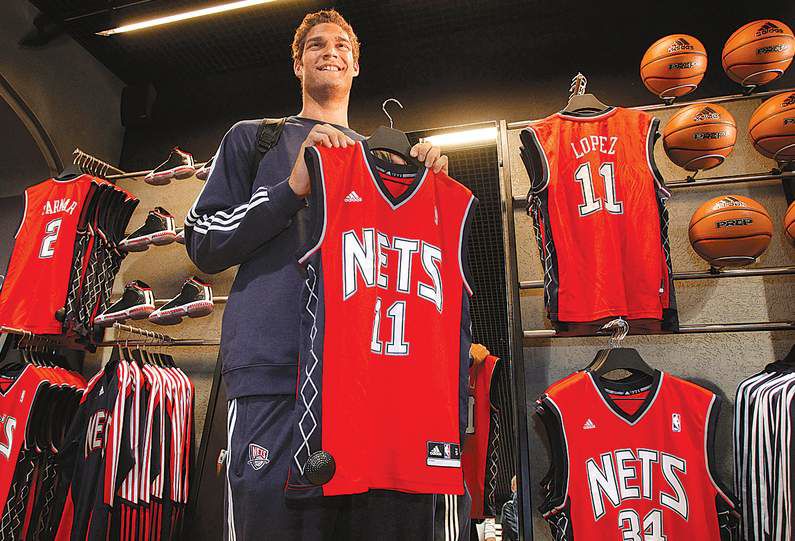Nets pursuing sponsors in Russia and beyond
Published 5:00 am Monday, October 11, 2010

- New Jersey Nets' Brook Lopez shows a jersey during the official opening of the first NBA store in Moscow, Russia, Sunday.
The Nets might be an odd choice to be the NBA’s ambassador overseas. With 12 wins last season, they are often a forgotten team even in New Jersey, where they fail to sell out their home games and live in the shadow of the cosmopolitan Knicks.
Yet the Nets are among the most active teams in courting international companies. Last year, six Chinese companies, including the electronics giant Haier, paid hundreds of thousands of dollars for courtside signs at the Izod Center, where Yi Jianlian played for the Nets.
Yi was traded in the off-season, so the Nets are now focused on Russia, the home of their new owner, Mikhail D. Prokhorov, who took over the team in May. The Nets lack a Russian player, but team executives have met with dozens of companies in Russia hoping to convince a few of them that advertising with the team is a good way to reach American and Russian consumers.
On Thursday, the Nets announced a five-year sponsorship deal with Stolichnaya, the Russian vodka producer.
The agreement, which Prokhorov helped arrange, is worth about $2 million a year and will include sponsored bars at the Barclays Center, the Nets arena being built in Brooklyn, N.Y.
The Nets looked to complete more deals in Moscow on Sunday on their way to China, where they will play two preseason games. In Moscow, the Nets held a clinic for 3,000 youngsters, attended a ribbon-cutting at an Adidas store that will feature Nets gear and schmooze with businesspeople at a reception.
“We have been talking about the Nets being a global team, and it seems really fitting that, as the first foreign owner of an NBA franchise, their first trip should be to my country,” Prokhorov said in a statement. “It is my hope that the Nets will be the team the country roots for once the season gets under way.”
Are the Nets’ efforts to court international companies a sign that they are having trouble attracting sponsors at home? Some sports marketing analysts say that the Nets are smart to piggyback on the NBA’s popularity overseas, where basketball is growing faster than in the United States.
“I don’t believe it’s a sign of weakness, but that sports business is global,” said David Carter, who teaches sports business at the University of Southern California. “It’s a chance for the team to build its overall brand, and big brands do well.”
The Nets are not the first team to make a push overseas. The Houston Rockets have become a brand name in China because of Yao Ming, their center. Thaddeus B. Brown, the Rockets’ chief executive, said five Chinese companies had courtside signs, and Anheuser-Busch and HP have signs in Mandarin at the team’s arena in Houston.
About 65 Rockets games were broadcast in China last season; the league collects revenue from broadcast rights. Revenue from the sale of licensed merchandise is split equally by all 30 teams.
The Knicks are getting into the act, too. This month, they played preseason games in Milan and Paris to showcase Danilo Gallinari, their Italian-born forward, and Mike D’Antoni, their coach, who played in Italy.
NBA teams have played games overseas for at least two decades. In addition to sending teams to preseason games in China, France, Italy and Spain this year, the Nets will play two regular-season games against the Toronto Raptors in London in March. The league and its teams see the games as a foothold to sell jerseys, sponsorships and television deals in Europe and Asia, and potentially attract other foreign owners. The games also mirror the changing face of the league; 20 percent of the players in the NBA were born overseas.
“Our goal is to grow the interest in the game and ultimately in the NBA in markets throughout the world with the recognition that, over time, fans in those countries will want to watch our games on television or various forms of digital media,” said Adam Silver, the deputy commissioner of the NBA.
Russia, Silver acknowledged, is a relatively untapped market. Although NBA games have been on television in Russia for more than a dozen years, basketball remains a distant third behind soccer and hockey in popularity. There are only a handful of Russian players in the NBA, most notably Andrei Kirilenko of the Utah Jazz and Timofey Mozgov of the Knicks. To increase its exposure in Russia, the league opened an office in Moscow this summer and has signed sponsorship deals with Adidas, EA, Nike and others. CSKA Moscow, a team once owned by Prokhorov, will play exhibition games against the Miami Heat, the Oklahoma City Thunder and the Cleveland Cavaliers next week.
Prokhorov plans to deepen ties further, not just because he is Russian, but because the Nets plan to move to Brooklyn, which has a large Russian-born population. In all, 250,000 people claim Russian ancestry in New York City, 75,000 of whom say they were born in Russia, according to census figures.
The Nets are creating a Russian-language website to better reach them, and have replaced a marketing specialist who spoke Mandarin with someone fluent in Russian. Still, signing deals with Russian companies will be more of a chore than finding clients in China, where basketball has made deeper inroads with fans and companies. “If I can get three or four solid deals after my first year, I’d be pleased,” said Brett Yormark, the chief executive of the Nets.






